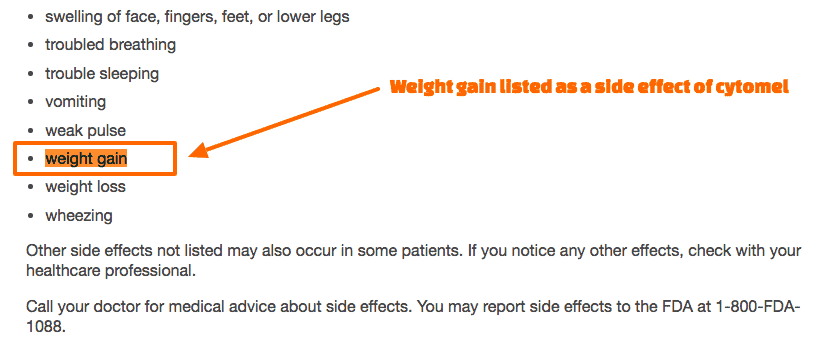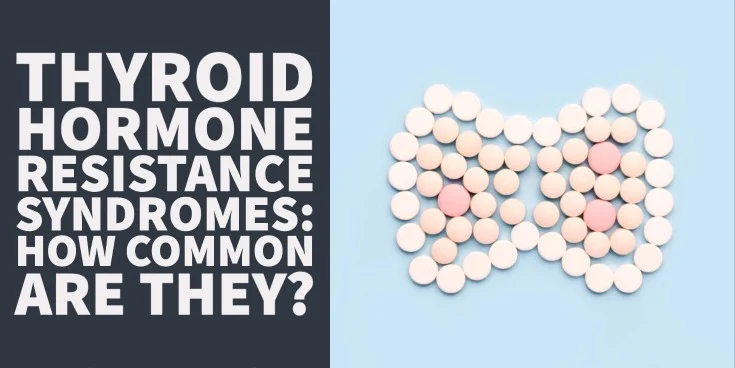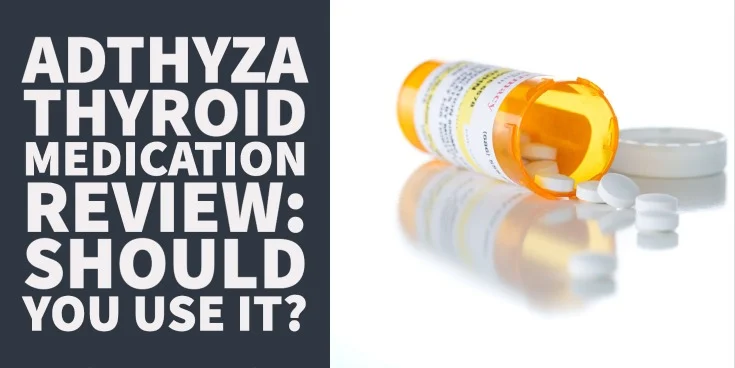Cytomel is the most powerful thyroid medication which means that it can also have some powerful side effects.
If you’re taking Cytomel and wondering if you are experiencing side effects then sit tight because we are going to dive into everything you need to know about this medication.
For instance…
Did you know that Cytomel can help with weight loss but that it can also cause hair loss in certain patients?
Unfortunately, many doctors aren’t used to prescribing Cytomel so many patients are left to figure it out for themselves.
And that’s why I created this guide – to help:
- People who have just started taking Cytomel
- People who have been taking Cytomel and are wondering if their side effects are caused by the medication itself or by some other cause
- People who are curious to know if Cytomel can be used to help them improve their quality of life
- People who want to know if this medication will help them with weight loss
- People who are struggling with hair loss and believe it may be due to their medication
- Those who just want to know more about Cytomel, how it works, why it’s different, and what benefits it provides to the body
Positive Side Effects of Cytomel
First off:
If you didn’t already know, Cytomel is a thyroid medication used to treat people who have a sluggish thyroid.
But that’s not all it can do.
It can also be used off-label to treat certain psychiatric disorders such as treatment-resistant depression and treatment-resistant bipolar disorder.
For now, we are going to focus on how it helps to treat the thyroid but much of this information will be relevant to you regardless of why you are using it.
Cytomel is the brand name for the generic T3 medication known as liothyronine, but both medications contain the same active ingredient known as triiodothyronine.
It’s most frequently used to treat the following conditions:
- Hypothyroidism from all causes (including Hashimoto’s thyroiditis, subclinical hypothyroidism, thyroiditis, thyroidectomy, hemithyroidectomy, and TRH-pituitary dysfunction)
- Obesity
- Depression
- Bipolar disorder
And what you need to know about Cytomel is this:
It is the active form of thyroid hormone, meaning that it is the most powerful thyroid medication you can take.
As a quick primer:
T3 is the active thyroid hormone while T4 is considered to be the inactive thyroid metabolite.
Both are technically ‘active’ in the body but T3 is hundreds of times more active than T4 (1).
It should be differentiated from other thyroid medications like Armour thyroid, Nature-throid, WP thyroid, levothyroxine, and Synthroid.
One thing you need to understand about thyroid medications is that generally, you should NOT be experiencing negative side effects when you take these medications.
Why?
Because, presumably, you are taking the hormone to replace a deficiency inside of your body.
If all you are doing is replacing that deficiency then you shouldn’t experience negative symptoms only positive effects.
Assuming you aren’t reacting to any of the fillers or binders in the medication itself and you are on the right dose of thyroid medication for YOUR body, then several things should happen:
- Your hypothyroid symptoms should be improving
- Your weight should be dropping
- Your hair should be falling out less
- Your energy should improve
- Your mood should improve
- You should not be anxious or depressed
- Your sleep should improve
Basically, all of the symptoms you were experiencing due to hypothyroidism should be improving, not worsening.
If you are experiencing any other symptoms (especially negative side effects) then that may be an indication that you are reacting to the fillers or binders in the medication or that your dose is not correct.
We will talk about how to find out if your dose is too high or too low, but for now, we will focus on what to do if these fillers or binders are causing you side effects.
DOWNLOAD FREE RESOURCES
Foods to Avoid if you Have Thyroid Problems:
I’ve found that these 10 foods cause the most problems for thyroid patients. Learn which foods you should avoid if you have thyroid disease of any type.
The Complete List of Thyroid Lab tests:
The list includes optimal ranges, normal ranges, and the complete list of tests you need to diagnose and manage thyroid disease correctly!
Inactive Ingredients in Cytomel
All medications contain a combination of both active and inactive ingredients.
The active ingredient is the ingredient that causes all of the physiologic benefits of the medication.
In this case, the active ingredient in Cytomel is triiodothyronine or L-T3.
The inactive ingredients help to stabilize the active ingredients and act as a carrier to prevent the breakdown of the active ingredient (2) in the stomach and so on.
They also are added to change the color, shape, or consistency of the capsule/pill.
The problem with these inactive ingredients is that certain patients may actually negatively react to them.
This may put you in a situation where you don’t react to the active ingredient (because you need it) but you may be reacting to the fillers/binders/inactive ingredients in the medication.
And determining what you are reacting to can be difficult at times.
For reference, Cytomel contains the following inactive ingredients:

- Calcium Sulfate
- Gelatin
- Starch
- Stearic Acid
- Sucrose
- Talc
It’s been my experience that many patients who use Cytomel and react negatively to it, are often reacting to inactive ingredients, especially starch or gelatin.
The good news, if you are one of those people who react negatively to the fillers, is that it is possible to compound the active ingredient into a formulation that contains fewer inactive ingredients.
Formulations such as sustained-release T3 can be created by compounding pharmacies.
It should be noted, however, that even the sustained release T3 formulation is not without faults.
Sustained release T3 (or SR T3) contains high amounts of methylcellulose (3) which can also cause similar problems and reactions in certain patients.
Bottom Line: If you are having negative reactions to Cytomel it may not be due to the active ingredient but instead due to the inactive ingredients.
The Complete List of Side Effects of Cytomel
This list will break down all of the possible reactions you may be experiencing while using Cytomel.
When it comes to side effects there are 3 main categories that you want to be looking at:
- Hypersensitivity reactions
- Overdosing
- Underdosing
Each category comes with a set of unique symptoms and understanding where you fit can help you determine if you need to switch medications or simply alter your dose.
1) Hypersensitivity Reactions
Hypersensitivity reactions are fairly common and can range from mild to severe, depending on the person.
These symptoms tend to come from the inactive ingredients, fillers, binders, preservatives, and dyes in the medication.

Symptoms of hypersensitivity to Cytomel may include:
- Rash, hives, or itching
- Swelling of the Face or extremities
- Tingling sensation in the hands or face
- Nausea or vomiting
- Headaches
- Difficulty breathing (rare but serious)
- Tightness in the chest (rare but serious)
If you experience any of these symptoms, and if they persist even after changing or altering your dose, then you may need to switch medications entirely.
Your best options may be to switch to the generic liothyronine medication or switch to a compounded SR T3 formulation.
2) Excessive Dosing
Perhaps more common than hypersensitivity reactions are those reactions caused by the dose of the medication itself.
Cytomel, as the most powerful T3 medication, is prone to causing symptoms that may mimic hyperthyroidism if used in high doses.
These side effects are potentially very serious and if you experience any of them you should seek advice from the provider who gave you the medication.
Their presence indicates that you will need to adjust your dosing or go off of your medication completely.
In many cases, however, you may be able to simply adjust your dose downward to eliminate them.
Sometimes, even though the dose may be appropriate, you may be extra sensitive to small increases in T3.

You can prevent some of this by simply increasing your dose in a slow and controlled manner.
A slow titration upwards may prevent symptoms such as heart palpitations, anxiety, and so on.
If symptoms persist despite lowering your dose then make sure to check your nutrient status and make sure your adrenals have been addressed.
Symptoms that may indicate your Cytomel dose is too high include:
- Rapid heart rate (This is why I recommend tracking your heart rate while taking Cytomel or liothyronine)
- Tachycardia
- Irregular heart rate
- Palpitations (Sensation of rapid heart rate but heart rate remains normal)
- Shortness of breath
- Sensitivity to heat
- Weight gain <—– Rare, but can happen
- Hair loss <—– Typically temporary but sometimes it can persist
- Increased sweating
- Jittery sensation or increased anxiety
- Dizziness or lightheadedness
- Chest pain or chest discomfort
- Diarrhea or loose stools

3) Insufficient Dosing
Last, but still important, is the idea that you may be on the right medication but your dose may not be high enough.
If you experience symptoms from this condition then it’s important to realize that these symptoms are not caused by the medication itself but by a deficiency in thyroid hormone in your body.
The symptoms that indicate your dose is not high enough include the same symptoms that correlate with hypothyroidism.
The persistence of symptoms such as fatigue, weight gain, constipation, hair loss, and depression may be an indication that you need to continue increasing your dose.
Will Cytomel Cause Weight Gain?
While it doesn’t make any logical or intuitive sense that Cytomel could cause weight gain, I have seen it happen in a handful of patients.
In addition, it is also listed as a potential side effect of the medication:

You can take comfort in knowing that this side effect happens very rarely and I’ve only seen it a handful of times.
With an occurrence of about 1% or less, it’s not a side effect that you should worry about before you consider using this medication.
It’s not clear to me why Cytomel would cause weight gain but I suspect it’s likely a reaction to a filler or binder within the medication itself.
I believe this to be the case because all the patients I know who have gained weight on the medication still experienced an improvement in their hypothyroid symptoms and they only experienced a mild weight gain of 3-5 pounds.
This would lead me to believe that the medication is still working to enhance thyroid function in their body and that the weight gain is caused by some other variable.
If you do gain weight on Cytomel it is worth switching to SR T3 to see if the problem still persists or switching to Natural Desiccated Thyroid if that fails.
Will Cytomel Cause Hair Loss?
One of the main symptoms that patients with hypothyroidism struggle with is hair loss.
And, I don’t want to alarm you here but Cytomel can actually make hair loss worse.
Don’t let this scare you away from trying this medication though, because the hair loss associated with it is only temporary.
In some patients (around 10% by my estimation) Cytomel can temporarily make hair loss worse for about a 3-4 month period.
The good news is that this hair loss is temporary and should resolve on its own without any intervention on your part.

The problem with this symptom is that it may stop certain people from continuing with their medication because they don’t know that it’s temporary.
No one really knows for sure why it causes worsening hair loss but I believe it may be due to an increased demand on the hair follicles which is exacerbated by other nutrient deficiencies.
You can imagine a scenario in which there is a strong signal sent through your body that triggers the growth of hair, but unless you have the building blocks to create the hair it may make the problem worse.
Something similar may occur in individuals who suffer from hair loss when starting Cytomel.
If you fit into this category then you’ll want to take certain hair growth nutrients including zinc (5), selenium, iron, and so on.
You can find a list of reasons why thyroid patients experience hair loss and how to fix them here.
If your hair loss persists after 3-6 months and after replacing all of your nutrient deficiencies then it may be time to consider other options.
In these cases, it’s best to lower the dose of Cytomel or switch to SR T3 or NDT if possible.
Conclusion
Cytomel is the strongest of the thyroid medications because it contains T3 instead of T4 like most other medications.
It can be used in conjunction with other thyroid medications or by itself and it can also be compounded in various forms to delay its release into the bloodstream.
Side effects from Cytomel are generally caused by either a hypersensitivity reaction to the binders and fillers inside of the medication or due to the dosage being too high.
If you experience side effects due to the binders or fillers, you may be able to change medications to SR T3 to get around these side effects.
If you experience side effects due to your dose, then you may need to address underlying nutrient deficiencies before raising your dose.
If these symptoms still persist then it may be necessary to switch to NDT or T4 medications.
Now I want to hear from you:
Have you taken or are you currently taking Cytomel?
Have you experienced any adverse side effects?
Is it helping you feel better? Is it helping you to lose weight?
Why or why not?
Leave your comments or questions below!
Scientific References
#1. https://www.ncbi.nlm.nih.gov/books/NBK285568/
#2. https://www.ncbi.nlm.nih.gov/pubmed/9024461
#3. https://www.ncbi.nlm.nih.gov/pubmed/15389670
#4. http://www.ncbi.nlm.nih.gov/pmc/articles/PMC3205882/
#5. https://www.ncbi.nlm.nih.gov/pmc/articles/PMC3870206/
#6. http://www.ncbi.nlm.nih.gov/pubmed/402379
#7. http://www.ncbi.nlm.nih.gov/pubmed/16883675
#8. https://www.ncbi.nlm.nih.gov/pmc/articles/PMC2831161/
#9. http://www.ncbi.nlm.nih.gov/pubmed/9064969
#10. https://www.ncbi.nlm.nih.gov/pmc/articles/PMC2831161/
#11. https://www.ncbi.nlm.nih.gov/pubmed/10878749
#12. https://www.ncbi.nlm.nih.gov/pmc/articles/PMC4350501/








